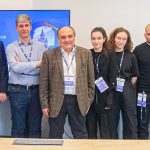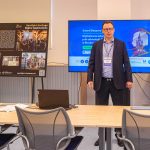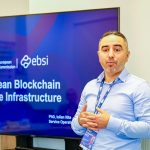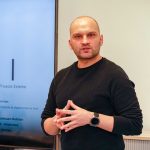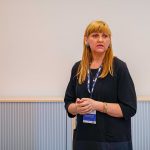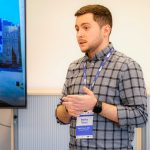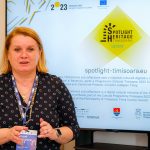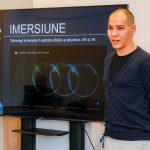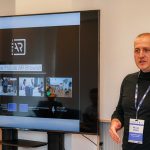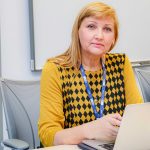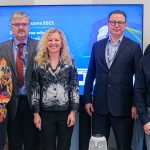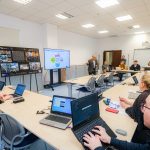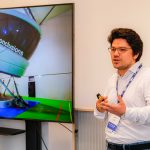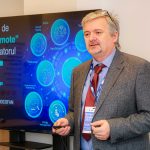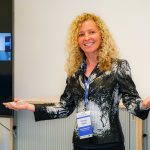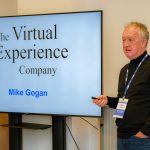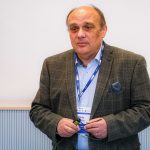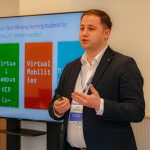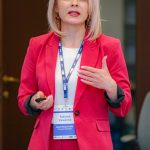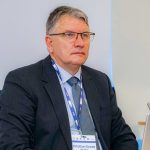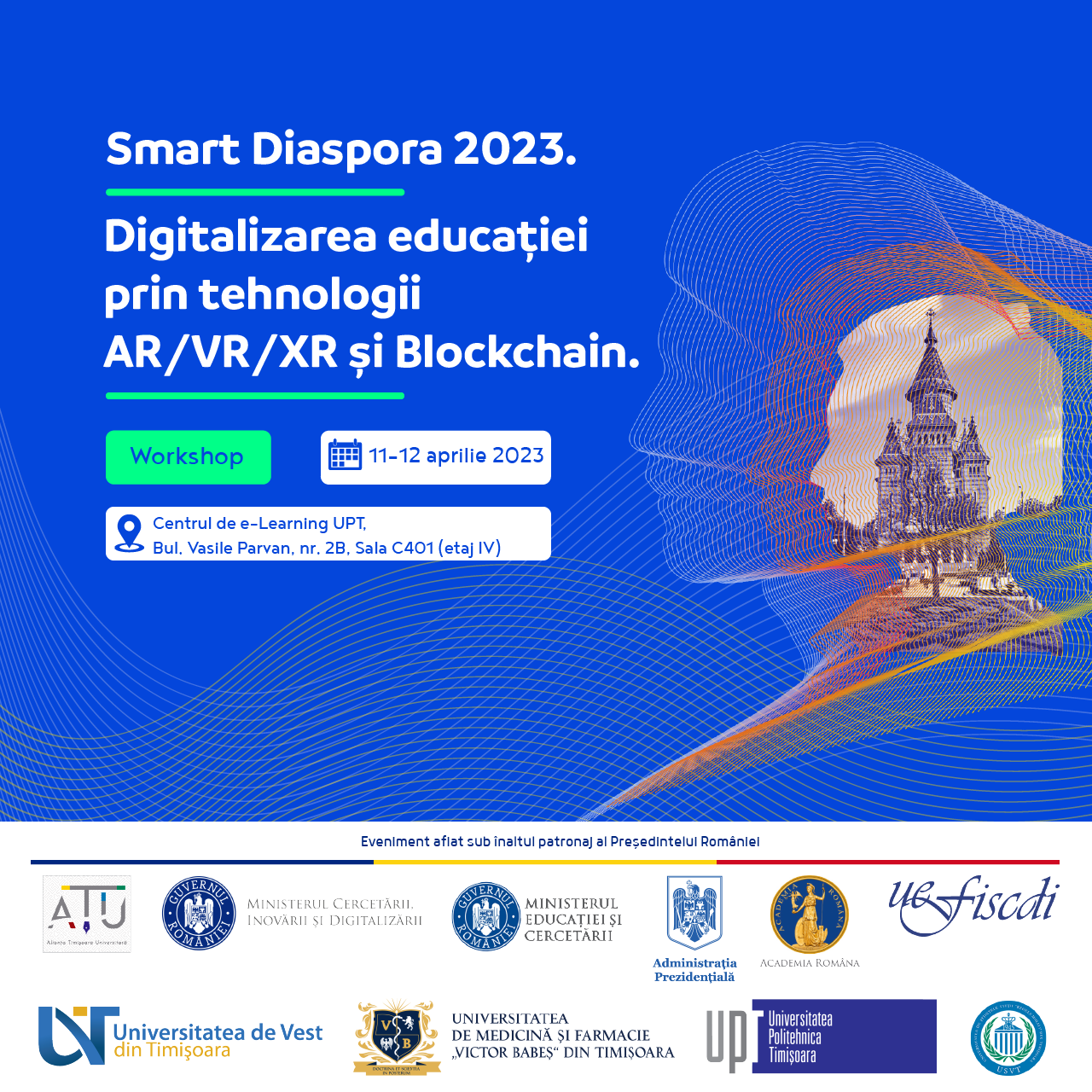
Smart Diaspora 2023. Diaspora in higher education, science, innovation and entrepreneurship. Digitization of education through AR/VR/XR and Blockchain technologies
Smart Diaspora 2023
Diaspora in higher education, science, innovation and entrepreneurship
Digitization of education through AR/VR/XR and Blockchain technologies
April 10-13, 2023
the conference"Smart diaspora 2023 - diaspora in higher education, science, innovation and entrepreneurship. Diaspora and its friends” aims to create a space of dialogue and collaboration between Romanian researchers, regardless of where they live and work, continuing the series of meetings of the Romanian scientific community at home and abroad that began in 2008. Smart Diaspora 2023 is organized between April 10 and 13, 2023 , in Timișoara, under the High Patronage of the President of Romania and the aegis of the Government of Romania, the Ministry of Education and the Ministry of Research, Innovation and Digitization, by the Timișoara University Alliance (ATU), UEFISCDI in partnership with the Romanian Academy.
April 10-13, 2023
The workshop addresses AR/VR/XR and blockchain technologies from the perspective of the ways in which they can contribute to the modernization of the educational process, adding digital components and increasing the degree of interactivity. From a technical point of view, the skills involved in these technologies, the infrastructure and platforms required for implementation, as well as the method of blockchain validation of the skills acquired will be presented.
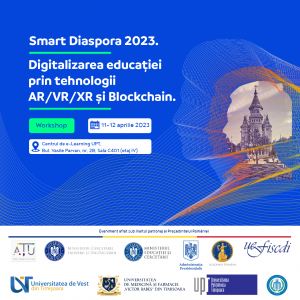
During the Digitization of education through AR/VR/XR and Blockchain technologies workshop, I had the pleasure of talking with Joseph Peterfi, a Romanian entrepreneur who is truly passionate about technology and develops unique projects in education and research.
Together with Iosif we discussed the use of type technology blockchain and how it can represent a plus in the development of research projects and more.
Through his presentation, Iosif encouraged the audience to adopt a positive approach in using blockchain technology in their professional environment. The purpose of such technology is to provide information on new trends disenchant (Decentralized Science) and DeEd (Decentralised Education) and to bring them to the center of attention of the academic framework.
Ambition and devotion know no bounds, and knowledge cannot be held in check either! The conference "Smart diaspora 2023 - diaspora in higher education, science, innovation and entrepreneurship. Diaspora and its friends" gave us the pleasure of inviting him to speak at the Digitalization of education through AR/VR/XR and Blockchain technologies workshop on Iulian Nita.
Iulian has a PhD in IT and is a blockchain architect at EBSI (European Blockchain Service Infrastructure), and innovation is the fuel that drives the engine of its motivation.
He currently holds the position of Service Opration Manager for the project EBSI and CTO of an innovative web application design and development company3.
With an experience of more than 20 years in the field of IT systems, Iulian strongly believes that blockchain technology can and will change the world, so in his discussions with us, he shared his passions and knowledge.
Cosmin Cioranu is a doctor in Redundant Systems, head of the IT Service and Support Infrastructure Department UEFISCDI (Executive Unit for the Financing of Higher Education, Research, Development and Innovation) and the coordinator EBSI4RO.
Cosmin introduced us and discussed with us about the Single Matriculation Register and how it is possible to certify diplomas via EBSI.
As we were able to discover during the presentation, blockchain technologies are an opportunity for development and connection at the academic level, with a spectrum of benefits that can be exploited for the benefit of scientific research.
In the age of digitization, the openness to the new, especially in the academic context, is a great opportunity for education to develop.
domain eLearning, open educational resources (OER), massive open online courses (MOOC) and type technologies blockchain are only some of the topics of interest to Carmen Holotescu, dean of the Faculty of Engineering and director of the Center for open education and blockchain within the "Ioan Slavici" University in Timișoara.
The project "EBSI4RO: Connecting Romania through Blockchain” is a step towards the digitization of education, so in the Digitization of education through AR/VR/XR and Blockchain technologies workshop I had the pleasure of discussing it based on it together with Carmen, where we could discuss the European priorities related to blockchain in education.
To continue the series of information on type technologies blockchain and to deepen what we discussed together with Carmen Holotescu about digitization, Șl. Dr. Eng. Andrei Ternauciuc and PhD student Victor Holotescu have joined us today to introduce a new dimension of using a EBSI.
As we know, digital educational platforms they have become a necessity for the academic system and beyond. Together with Victor and Andrei, we were able to find out how we can integrate new technologies, micro-credentials, and also EBSI in an educational platform.
The world of education is constantly growing and changing, so with the discovery of new territories of technology, we also discover new ecosystems that we study.
Together with Sl. Dr. Eng. Aurelia Ciupe And with Miruna Curunt I broke into EDUverse and we discussed about Exploring Immersive Ecosystems as an EdTech Innovation.
The experience that Aurelia and Miruna have accumulated over time with the team is at UTC eCampus (Technical University of Cluj-Napoca), and the progress that the project eCampus in recent years have shown us what could already be observed: the Romanian digital educational space is constantly moving and developing, continuing to be a living energy that prominent teachers and researchers will continue to study.
We continue the immersion in university ecosystems and address a more practical topic, namely, how we shape the university ecosystem in the context of the digital transition.
About the university ecosystem and transition I spoke with Bogdan Orza, lecturer at the Technical University of Cluj-Napoca, director of the Department for Continuing Education, Distance and Short-Term Education and coordinator of the Multimedia Systems and Applications Laboratory.
Bogdan's experience and knowledge gained as director of the Continuing Education Department helped us to understand new concepts of adaptation and how digitization represents, in the current context, a vital part in the evolution of the Romanian university environment.
Through the workshop Digitization of education through AR/VR/XR and Blockchain technologies I had the pleasure of talking with Prof. Dr. Eng. Silviu Vert.
Lecturer engineer in the Communications Department of the Faculty of Electronics, Telecommunications and Information Technologies, Timișoara Polytechnic University, Silviu presented us augmented, virtual and haptic reality technologies and how they can revolutionize the learning process.
In the year 2023, culture and innovation are the main points of reference for us.
In the workshop Digitization of education through AR/VR/XR and Blockchain technologies we also met with Marius Tataru, PhD student at Polytechnic University of Timisoara.
Marius is a passionate young man by new technologies in the digital field, such as 3D modeling and virtual reality applications. Through his initiative and dedication, he helped and supported our soul project – Spotlight Heritage Timișoara, developing applications for heritage and its promotion, participating in various competitions and international events.
Representing the city Timisoara, But and CeL, Marius is one of the young people who give us the daily motivation to keep looking forward to a constant development of the academic environment.
In the era of digitization one of the areas that has been greatly influenced and that has enjoyed continuous development has been education. The digitization of education has meant for many vast and new territories to explore.
Through the Digitization of education workshop through AR/VR/XR and Blockchain technologies I had the pleasure of chatting with Sabin Şerban, a developer and designer of experiences in the field of augmented reality and of mixed reality, along with those from Augmented Space Agency.
Sabin took us on an immersive journey into the new technologies of VR and It used in artistic and educational applications, intended to improve the user experience and facilitate the learning process.
In the era of digitization one of the areas that has been greatly influenced and that has enjoyed continuous development has been education. The digitization of education has meant for many vast and new territories to explore.
Through the Digitization of education workshop through AR/VR/XR and Blockchain technologies I had the pleasure of chatting with Sabin Şerban, a developer and designer of experiences in the field of augmented reality and of mixed reality, along with those from Augmented Space Agency.
Sabin took us on an immersive journey into the new technologies of VR and It used in artistic and educational applications, intended to improve the user experience and facilitate the learning process.
The first day of workshop Digitization of education through AR/VR/XR and Blockchain technologies with Razvan Boldis.
Răzvan is an entrepreneur with more than 7 years of experience in the field of development of base solutions augmented reality. As a guest, he spoke to us about indexing and augmented reality as a service for use in education and learning innovation.
Like the rest of his colleagues, Răzvan showed us that there are no limits when we talk about the development of new technologies and how they can be integrated into academic life in Romania and beyond. The pioneering work has been done, and now we just have to look forward and continue what has been started.
The second day a workshop Digitization of education through AR/VR/XR and Blockchain technologies started with a topic that has been on everyone's lips for the last few months, be it pupils, students, teachers: Artificial intelligence.
I had the pleasure of opening today's discussions with Alexandra Cristea, Professor and Head of the Innovative Computing Research Group at Durham University's Department of Computer Science.
Alexandra has an impressive research portfolio that includes areas such as web science, learning analytics, user modeling and personalization, the semantic web, the social web, authoring, and last but not least, architecture for adaptive systems.
The main point of interest we discussed was Artificial Intelligence in Education and how it has slowly but surely penetrated the academic and educational environment.
Currently it is not a secret for anyone that digitization it permeated the daily life of each of us. The academic environment was no exception, so every day we face digitalization in one form or another.
Considering this transition and transformation we are facing in the age of digitalization, it is normal to have a point of discussion on the strategy and structuring of these changes.
Dr. Ing. Diana Andone, teacher and The principal Center for ID/IFR and e-Learning of Politehnica University of Timisoara. With an experience in the field of digitization, which includes planning and implementing digital and online learning technologies, Diana helped us understand where to start and how we can structure a successful digital transformation strategy for universities.
As the transition to digitization is inevitable, discussions on these topics are absolutely necessary to prepare for the rapid pace at which the technology around us advances seemingly without stopping.
"Together we are stronger” – is an expression we have come across at least once in our lives, be it personal or professional.
This is not foreign to the Romanian academic environment either, so today we addressed a discussion about European Universities, which are alliances of higher education institutions across Europe that cooperate in education, research and innovation for the benefit of students, teachers and society.
Prof. Univ. Dr. Eng. Radu Vasiu It is President of the Senate of Politehnica Timișoara University and Director of the Multimedia Research Center. He presented to us today how digital transformation can develop this concept of alliances of higher education institutions.
In the age of speed and convenience, long periods of time to achieve or reach a certain result already raises questions among people, so we all want to have everything here and now.
Considering these aspects, at the present moment the most optimal option, especially in the academic field, would be use and recognition microcredentials for higher education. They attest to the results of short-term learning experiences, such as a course or short-term training.
Present with us at the workshop Digitization of education through AR/VR/XR and Blockchain technologies, Dr. Gabriela Grosseck, university lecturer in the framework Department of Psychology of the West University of Timișoara, Romania. His research interests cover the main aspects of open education (OERs/OEPs and MOOCs), Web 2.0 tools and social media applications in higher education and, more recently, the area of “digital literacy”.
Gabriela gave us a presentation full of explanations and examples that attest to the importance and potential of microcredentials in higher education and in the workplace. With well-documented case studies and favorable results, it attests to the fact that the future of higher education can be guided to a successful new path.
The subject virtual reality it usually makes us think of something technical, maybe even video games, but this is a limitation that we give due to the lack of concrete cases of applicability of these new technologies.
Virtual reality it is more than that and can be used in areas that we would not even have thought of later, namely the area of the teaching-learning process. But what would it be like to think that students, future doctors, study and learn through digital laboratories how to practice this field so important to our lives?
The past and previous crisis situations provided an impetus for people to adapt, so necessity and curiosity pushed the boundaries and made the Valentine Popa, university assistant at the "Victor Babeș" University of Medicine and Pharmacy to discover new fields of practice for his students.
He discovered how he can use virtual reality to help his students continue to improve their learning through new methods, even today, improving their instincts.
We continue the immersion in the use of virtual reality and that of augmented reality in the context of the digital transition in the university environment by discussing the use MOOC (Massive Online Open Course) and OER (Open Educational Resources) in education.
Vlad Mihăescudthe rector of the Center for Innovation and Technology Transfer UPT. Vlad has a doctorate in educational models and technological MOOCs and has over 15 years of experience as a trainer in areas such as multimedia technologies, social media, e-learning, usability and more.
The teaching-learning process is a leitmotif of this day, so, through his presentation, Vlad gave us an insight into the most optimal strategies that can help us improve these skills and become more and more good at teaching and sharing information in both teacher-student and student-student relationships.
In the workshop Digitization of education through AR/VR/XR and Blockchain technologies, I had the pleasure of chatting with Prof. Dr. Eng. Muguraș Mocofan, professor at the Politehnica University of Timișoara.
His research interests are in the field of multimedia databases, image processing, dynamic textures, smart cities, mobile applications, e-learning, multimedia and web technologies.
Considering the digitalization of education and the need to adapt to the constant changes in the field of education and the academic area, especially in the teaching-learning process, Muguraș presented us with a series of strategies and intelligent solutions to adapt remote courses and information for each situation encountered in recent years.
Education is characterized by virtual and digital, but have you ever wondered how the brain reacts to digital and virtual materials?
At the second session a the workshop Digitization of education through AR/VR/XR and Blockchain technologies he pleased us with his presence and a presentation of ultimate interest Carmen Simon, cognitive neurologist and Chief Science Officer of Corporate Visions, California, USA.
Carmen has developed a revolutionary approach to creating memorable and active content messages that are easy to process, hard to forget and impossible to ignore, using the latest brain science.
Carmen Simon is just one of the speakers who will delight us today with their presence, but also with research projects in the field of new technologies and digitization in the context of education.
Because we are in 2023, the year Timisoara Cultural Capital, we can't help but have presentations about patrimony, culture and education.
He joined us Mike Gogan, founding director of Virtual Experience Company Ltd., UK.
With over 20 years of experience, Mike has worked with a wide range of technical, academic and professional partners, building relationships and acting as a catalyst to bring creative concepts to reality.
This very ambition gave him the opportunity to study new technologies in order to make new discoveries in the promotion of cultural heritage, but also in the development of education, making a transition from traditional to digital studies.
"Accuracy" is a concept that should not have the ability to be prone to change under any circumstances. But what if we told you that including "exactness", especially the exact sciences can suffer from small changes produced by the need to adapt to everything that changes around us.
Digitization, especially in education, is – as I mentioned these days – inevitable. New technologies are discovered, tested and introduced into our lives, and as humans are constantly learning beings throughout life, it is only natural that we integrate what we discover into education. Being relevant is, after all, a trait of modern society.
With these aspects in mind, today I spoke with dr. conf. univ. Tatiana Sveriță, at Chisinau State Pedagogical University.
Tatiana gave a presentation on using technology VR and It in the field of exact sciences. Specifically, ways to integrate their use and application in education. An example would be Marker-Base AR and the ability to recognize shapes, which represent a new dimension of learning that can be applied in a classroom and beyond. The areas targeted for these studies were those found in the learning method STEAM (Science, Technology, Engineering, Art and Mathematics).
We end the presentation session with Cristian-Gyozo Haba, professor of the Faculty of Electrical, Energy and Applied Informatics Engineering of the "Gheorghe Asachi" Technical University in Iași, who was one of the guests the workshop Digitization of education through AR/VR/XR and Blockchain technologies.
Cristian gave us a presentation about the use of technology augmented reality in the field of physics and how we can use it to facilitate the learning process of both pupils and students.
The project we were told about was ARphymedes, named after the famous physicist Archimedes, arose from the desire to offer young people new ways of accessing a science that literally surrounds us and is present everywhere in our lives - Physics.
As Cristian also told us, ARphymedes, through a dedicated mobile application, offers the tool that will put the student on a path to explore physics through time and significant events, with the opportunity to test and experience interactively what is presented.
Books dedicated to these unique interactions have been printed and prepared to give students the chance to follow their curiosities and dreams and embark on their own path of research into a field without which we could not live.
